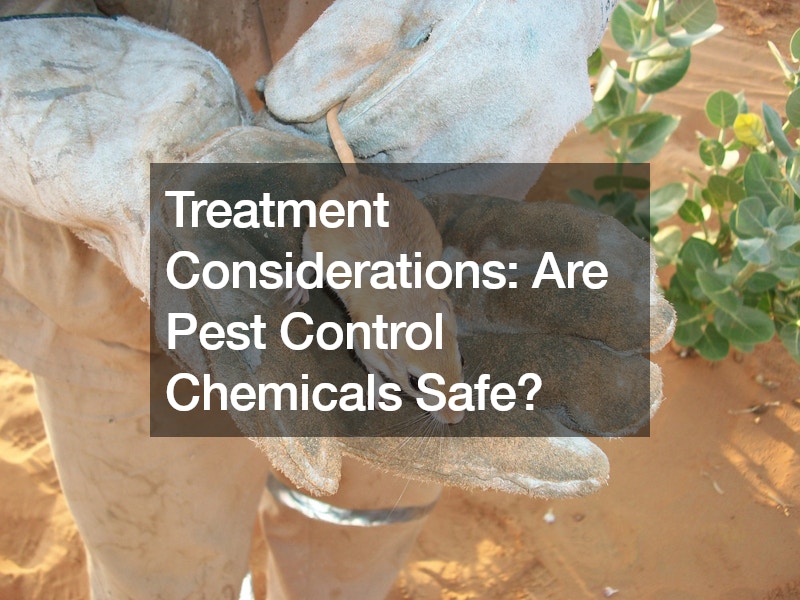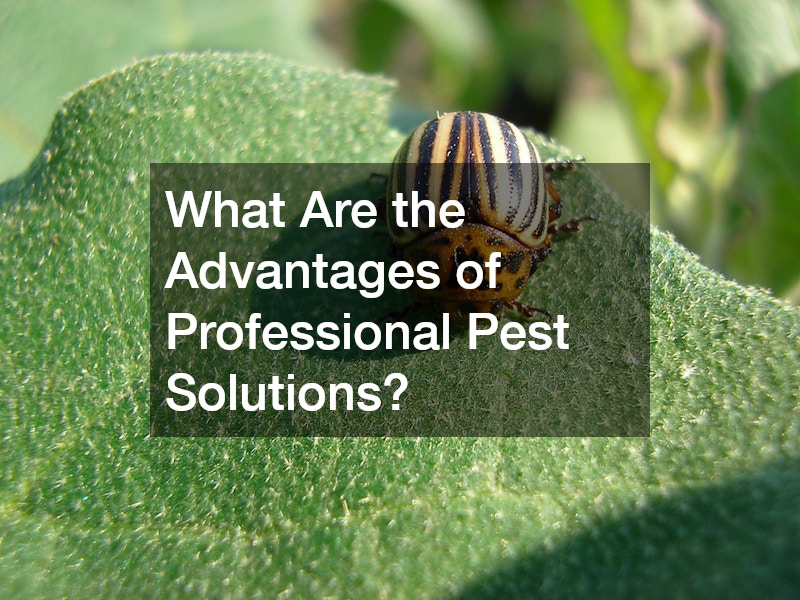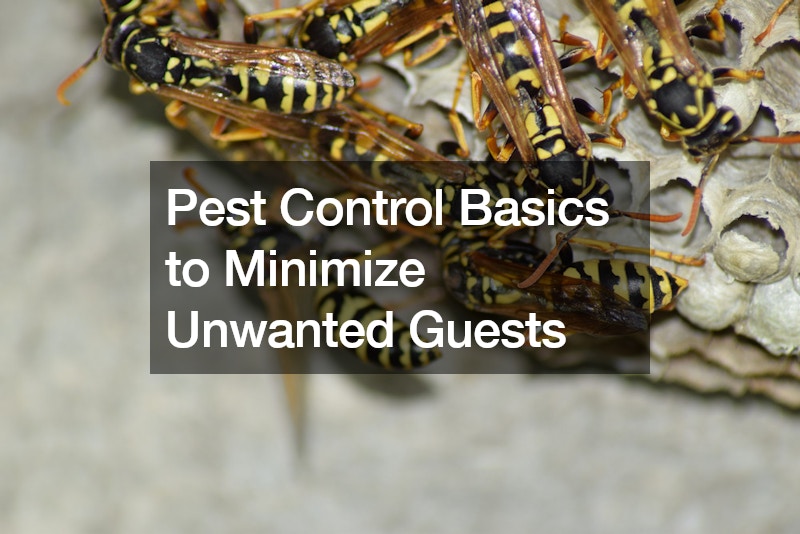The pest control industry has undergone many changes over the years, and its future will likely undergo further changes. According to Deskera, one of the most influential current trends in pest control chemicals is eco-friendly pest control. These practices emphasize using essential oils and other natural products to prevent pests. Another benefit of eco-friendly pest control is that its chemicals are safe for humans and pets, making them popular in modern homes.

Facts About Pest Control Chemicals
When we see pests in our homes or gardens, our instinct may be to eliminate them immediately. However, some pest control chemicals have caused scientists to ask, “Are pest control chemicals safe?” According to the National Resources Defense Council (NRDC), toxins from pest control chemicals have been seeping into 90% of our rivers and streams since after World War II. Those toxins have been shown to cause medical problems in many of our body systems.
The harmful effects of pesticides are even more hazardous to children, who often spend time playing on the rugs – nearer to the place where the pesticides have been sprayed. Children are also less resilient to the effects of the toxins in those chemicals. According to the NRDC, half of the cases of pesticide poisoning occur in children under age six.
Since the harmful effects of these chemicals became known, pest control companies have tried to create safer products. These changes have also inspired many homeowners to use homemade solutions made of natural ingredients. Vinegar, lemon, and baking soda are mixed with water and repurposed into cleaning solutions.

Bee Repellant that Doesn’t Kill Bees
No one wants to be stung by bees, so if you have an unwanted beehive in your yard, it’s understandable for you to want them eliminated. Bees are pollinators, which is an essential action for human survival. According to Greater Good, bees pollinate 3/4 of the flowering plants in the world – and over 1/3 of the world’s food crops.
Regarding bees, some may ask, ‘Are pest control chemicals safe?’ In the case of bees, the answer is ‘not all of them.’ If you want bee control without chemicals, a smoky fire ignited with cardboard is a very effective way. If you chop some garlic cloves and mix them with water, it will also chase away bees.
If bees form a hive inside your home, you can use a citronella candle to evict the bees without harming any people or pets. Another smell that bees don’t like is peppermint. If you want a fragrant plant that will also serve to repel bees, plant peppermint will fill your home with green leaves and a scent you’ll enjoy – even if the bees don’t.
Pest Control to Keep Your Roof Intact
Protecting your home from an ineffective roof is a responsibility you must take seriously. To do so, it will be essential for you to observe your home for signs you need a new roof. One of the most destructive pests to a roof is termites, which eat wood. Termites also eat your roof’s rafters, decking, and trusses.
Other pests that can ruin your roof include rats and mice, which chew through the materials that compose your roof. Chipmunks and squirrels can also gnaw through your roof. The damage these rodents can do goes beyond holes in the shingles; it can leave the house vulnerable to the elements. If you have questions about the safety level of your roof, check with a local roofer.
When protecting your roof, you may ask: ‘Are pest control chemicals safe?’ As it refers to pests on the roof, the answer is ‘only some of them are.’ Boric acid can kill termites safely – a powder that is not harmful to humans or pets. If you want a similar solution with a pleasant smell, orange oil is poisonous to termites.
Crawl Space Pest Protection
The crawl spaces in a typical home are made in a way that requires proper lining or insulation. When snow or rain enters the crawl space, the moisture inside will attract pests. When that water builds up, mold is likely to grow. Mold can cause respiratory illnesses and other physical symptoms.
Some homeowners contact professional companies that provide crawl space insulation services. The safest material to use for insulation is foam insulation board. Other standard methods of keeping crawl spaces pest-free include creating a vapor screen (typically made of plastic or foil) or sealing cracks in the crawl space. A dehumidifier can also be effective to reduce moisture in your crawl space.
Therefore, you may wonder, ‘Are pest control chemicals safe?’ Some of them are used when providing mold prevention. Using a layer of baking soda inside the crawl space can be an effective way to prevent mold. Washing with hydrogen peroxide provides the same benefits and is equally safe for humans.

Better Choices for Home Insulation
Crawl spaces aren’t the only place in your home where home insulation is needed. Insulation is essential behind your walls and in your attic. Traditional materials used for home insulation can lead to irritation of the eyes, nose, and throat. If you breathe in insulation fibers, it could lead to respiratory problems.
Wondering, “Are pest control chemicals safe?” may prompt you to seek alternatives to the pest control chemicals you may have planned to use for insulation. According to Bird Insulation, adding boric acid can help add pest-control properties to the insulation. Although some brands of insulation already contain boric acid, not all do, so adding boric acid will provide pest-control properties to your insulation.
When looking over your choices for insulation, it is better to look at the ingredients list for natural materials, such as repurposed cellulose, hemp, sheep’s wool, and cork. When you place materials inside your walls, use fasteners rather than adhesives. Modern companies are now finding ways to repurpose shredded denim or nutshells into natural insulation. Newer versions of cellulose are currently being crafted from recycled newsprint.
Safe Wooden Deck Protection
When you have a wood deck, you are at risk of an infestation of wood-eating insects like termites. If termites eat the deck’s wood, the deck could collapse. In addition, you could have carpenter ants making a nest in the deck, which would compromise the strength of the deck. Other creatures that can damage the deck’s wood include rodents, who must gnaw on wood to prevent their teeth from growing too long.
The easiest way to keep your deck from attack by these creatures is to keep your deck clean. Blue dishwashing liquid, mixed with water is a practical, non-harmful solution that will clean the deck. According to Homes and Gardens, it’s best to apply the dish soap mixture to the deck when it’s dry.
Asking, ‘Are pest control chemicals safe?’ (as it applies to your deck) will reveal that only a limited number are safe. If you check at a home and garden store, you can find an eco-friendly wood stain that can proactively protect your deck. Homeowners trying to decide which commercial pest control chemicals to use may need help determining if all the ingredients are safe. However, using natural products allows homeowners to find a safer alternative.
Pest Control in House Cleaning
Cleaning your home may not be fun, but wise homeowners know it not only makes your home clean but also prevents invasion of household pests. Ants are the most common household pests, and they are attracted to sweet things. You may also get cockroaches in your kitchen because they like to find food. Bedbugs are a potentially dangerous problem in mattresses, and they can travel on furniture or luggage.
Many solutions used for home cleaning have toxic ingredients. Asking, “Are pest control chemicals safe?” will likely prompt a mention of phthalates (chemicals used in fragrances.) According to Experience Life, phthalates can also negatively affect hormone levels. A safe alternative to phthalates is fragrance-free products or essential oils after cleaning.
Another typical household cleaner culprit is Triclosan, which is found in antibacterial dishwashing soap. Because Triclosan aggressively combats bacteria, it can result in drug-resistant infections. Quaternary ammonium compounds, which are found in fabric softeners, can have the same results. A safer alternative to both these solutions is household vinegar.
Safer Options for Invading Animals
In addition to rodents and insects, there may be larger animals that can invade your home. Small holes in your walls and foundation could allow snakes to crawl inside your home, which leaves you at risk for snakebite. Skunks are another animal you wouldn’t want to have in your home. Skunks aren’t necessarily harmful, but if startled, they can release a foul odor that can make your home unpleasant.
Raccoons are more destructive than skunks, and if they get into your home, they can destroy pieces of your walls or bite you. If any of these animals contract rabies, their bite could be fatal. If you see any invading creatures, your first action might be calling animal control companies for help. But, if you decide to get rid of the pests in your home, you might ask, “Are pest control chemicals safe?”
Some measures used for the control of these larger pests are safer than others. If you mix cinnamon and clove oils, you can keep snakes out of your home. To ward off skunks, one of the deterrents suggested by experts is scattering orange peels. If raccoons are invading your home, mix cayenne pepper, hot sauce, and chopped onion in boiling water and spray that mixture onto the places where you saw the raccoons.
Kitchen Cabinets Can Be Protected
Your kitchen is where your food is prepared, and kitchen cabinets are where your food is stored. If food gets spilled into the cabinets, ants or other bugs will get inside the cabinets. Mice and other rodents can crawl into your home if there are any wall holes. An added challenge with killing pests in the kitchen is that anything you use has to be safe with food.
The most likely pests in a kitchen wall cabinet include ants, moths, beetles, and weevils. This type of pest is often called a ‘pantry pest’ because of its likely location. They thrive in dark, enclosed spaces like these cabinets. Some can find their way into the foods stored in those cabinets.
Because you want to rid your kitchen of these pantry pets, you may ask, ‘Are pest control chemicals safe?’ Not all pest control chemicals are safe. One of the safest ways to keep pests out of your cabinets is to place any opened foods in closed containers. However, spraying essential oils – like lemongrass, eucalyptus, and tea tree oil on the clean surfaces of your cabinets will act as a preventative.

Solutions for Commercial Cleaning
Commercial buildings are also prone to invading pests, and they can cause problems for business owners and their employees. While this is especially true in businesses dealing with food, pests can hurt any commercial building. In addition to the previously mentioned pests, commercial buildings can attract spiders and flies. Since keeping your business’ buildings safe will influence your company’s success, you’ll have an even bigger reason to ask, ‘Are pest control chemicals safe?’
Since many commercial buildings outsource their cleaning services to a janitorial service, you should be sure that the company uses non-toxic pest control chemicals. All household chemicals useful for cleaning can also be utilized in a commercial setting – albeit in larger quantities. According to the University of Arkansas, a good general-use cleaner can be made with vinegar, essential oil, and Castile soap dissolved in water. The same source recommends using hot water rather than cold water.
To better understand which type of cleaner to choose, based on what kind of cleaning is needed. For surfaces that need an abrasive touch, where you might be tempted to use a caustic cleanser, boric acid or baking soda is a natural alternative. For those looking for an alternative to bleach, many use hydrogen peroxide.
Baking soda or washing soda eliminates fatty deposits or greasy dirt. Be attentive to the ingredients of any manufactured cleaning product or employ a DIY solution. By adopting some of these healthier practices, the next time you ask, ‘Are pest control chemicals safe?’ you can now answer affirmatively about the ones you choose to use.



